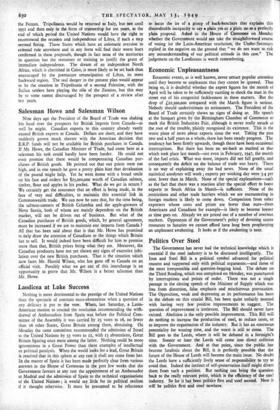Politics Over Steel
The Government has never had the technical knowledge which is essential if the steel industry is to be discussed intelligently. The Iron and Steel Bill is a political symbol advanced for political reasons and supported only with political arguments.—and those of the most irresponsible and question-begging kind. The debate on the Third Reading, which was completed on Monday, was punctuated by interruptions and points of order. There was not a single passage in the closing speech of the Minister of Supply which was free from distortion, false emphasis and mischievous provocation. The Opposition, weak and depressing as its performance has been in the debate on this crucial Bill, has been quite unfairly taunted with having very few positive improvements to suggest. The question of improvement is irrelevant. The Bill should never have existed. Abolition is the only possible improvement. This Bill will do nothing to incre.ase the production of steel, to reduce costs, or to improve the organisation of the industry. But it has an enormous potentiality for wasting time, and the worst is still to come. The Bill goes to the Lords, where it will be debated in a fortnight's time. Sooner or later the Lords will come into direct collision with the Government. And at that point, since the public has become fatalistic about the Bill, it is perfectly possible that the future of the House of Lords will become the main issue. No doubt the Lords have a sufficiently lively sense of responsibility to try to avoid that. Indeed the instinct of self-preservation itself might divert them from such a position. But nothing can bring the question back to the really relevant point, which is the efficiency of the steel industry. So far it has been politics first and steel second. Now it be politics first and steel nowhere.






































 Previous page
Previous page